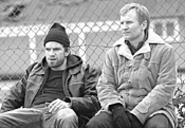The scaffolding of the film is a sibling rivalry. The older brother, Michael (Ulrich Thomsen), is a dutiful army officer and family man who lives in Copenhagen with his lovely wife, Sarah (Gladiator star Connie Nielsen), and two young daughters. The younger brother, Jannik (Nikolaj Lie Kaas), is a sullen outlaw type who's just been released from prison after doing time for assaulting a woman. Where Michael is sensible and controlled, Jannik is reckless and irresponsible.
No sooner does Jannik get out of jail than Michael is shipped off to fight in Afghanistan, confident in his training and buoyed by the belief that he's doing the right thing. Then, catastrophe. Michael's helicopter is shot down, and military authorities conclude that everyone aboard has been killed. Why, in the absence of bodies, these soldiers are not listed as missing in action is a question only Bier and screenwriter Anders Thomas Jensen can answer. But for the purposes of their plot, Michael's parents, his grieving widow, her children, and her troubled brother-in-law endure a memorial service and start trying to cope.
Jannik's adjustment is more like a personal reinvention. His stern, stricken father (Bent Mejding) still disapproves of him, but the troubled younger son helps remodel Sarah's kitchen. He entertains his nieces. Offscreen, he apologizes to the still-traumatized woman he attacked. In what they both see as an expression of mutual sorrow, Jannik and Sarah share a kiss. What no one knows, of course, is that Michael is alive in a Taliban prison camp and that he's about to return home a changed man -- an angry, disturbed man much more like the pre-redemptive Jannik than the upright husband and father he once was.
What happened to Michael in Afghanistan? The prison-camp scenes are harrowing, and the turning point comes when the captured officer has to make a hard choice. From that the entire moral scope of the film radiates. Tormented by his secret, Michael becomes a vessel for several burning questions about war and responsibility -- and if answers don't come easily, so much the better.
In its second half, Brothers' psychological tension grows very keen. Michael's transformation from a bourgeois drone into a violent paranoiac threatens to shatter his family and drive him insane: It also raises all kinds of issues about mission, duty, and the demands of love in a world where the certainties of absolutism are forever colliding with questions of moral judgment. Beautifully acted and disturbing to its core, Brothers addresses those collisions with grace and intelligence.










